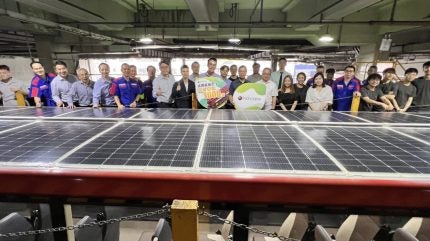
With sustainable mobility remaining front and centre of automakers’ goals in the lead up to 2030, there is another crucial aspect of the green transition that can be overlooked: access to mobility and social inclusion.

Discover B2B Marketing That Performs
Combine business intelligence and editorial excellence to reach engaged professionals across 36 leading media platforms.
Just Auto interviewed Mike Bowers, Chief Sustainability Officer at Inchcape, a leading independent global automotive distributor with a presence in over 40 markets worldwide.
Mr Bowers lent his insight into the importance of having local expertise to help guide Inchcape’s OEM and brand partners in smaller and more complex markets, and how bringing mobility to the world’s communities enables better social inclusion and education opportunities.

Dani Cole: Could you give us an outline of your role and what your day-to-day looks like?
Mike Bowers: I’ve got two hats: I’m both the group General Counsel at Inchcape where I head up the legal team for the organisation and I’m also the Chief Sustainability Officer.
If I think about my legal hat it’s about delivering the legal services across the group, making sure were attendant to legal risk and keeping the organisation safe and driving a robust approach to compliance.
When I think about our sustainability work, it’s really leading our thinking and the execution of what we do in terms of our responsible business approach which we split into four pillars: people, planet, place, and practices. It’s making sure we have a consistent vision for that approach to sustainability – everyone knows what they’re doing. We’re getting people engaged in the journey and we’re executing against all the things we want in those pillars.
Inchcape has a purpose: to bring mobility to the world’s community for today, for tomorrow and the better.
DC: Talk us through how you see the EV market evolving and how you utilise local expertise to help guide partners to deliver sustainable mobility.
MB: Inchcape has a purpose: to bring mobility to the world’s community for today, for tomorrow and the better. We’re present in 40+ markets across the world with 60+ OEM partners but that’s out core purpose. Why mobility is so important is that it’s a real enabler of social inclusion: when people have access to vehicle ownership, it means they can participate in education, work, and leisure opportunities – things that might not be available to them if they don’t have access to mobility though vehicle ownership. We’re really proud of what we do there: it’s really key to driving social inclusion.
We also know as an industry the way we need to deliver mobility needs to change – it needs to become more sustainable. We need to drive down emissions because we know that road transport accounts for 15% of global emissions. So we have a big part to play as an industry in addressing man-made climate change – and to reduce emissions.
The good news is the industry is stepping up – there are no end of technological innovations the industry is driving to help to do that, principally through the changing drivetrain. We are going through this transition of sustainable mobility [and] the best understanding is that it will be battery electric as the most likely end-point.
What’s interesting is the way that’s happening: the pace and the characteristics of that transition are different market-to-market. There are a lot of local factors involved. It’s not one straight line, uninterrupted; it is not the same journey everywhere. You see some markets moving really quickly like Norway and Hong Kong, and other markets where it’s taking a little longer for that to gain traction.
We see trends in markets, and we bring our local expertise and knowledge to help interpret that for our OEM partners so they can bring the most relevant product to market when the markets are ready to receive it. In some markets that means BEVs faster, and in others a mix of BEV and hybrids and ICE, and some markets will be slower and will be predominantly ICE for longer.
We also know as an industry the way we need to deliver mobility needs to change – it needs to become more sustainable.
It was announced earlier this year that Inchcape would sell its British dealerships, which will simplify its business – what’s the status of Inchcape in the UK now?
We announced in April that we will be selling our UK businesses to Group 1 Automotive, which is a US-based automotive retail organisation. That’s subject to only one condition which is FCA approval for that disposable to take place – we’re just waiting for that approval to come through and were expecting that in the coming months.
The rationale for that transaction is we are strategically speaking, a distributor for the brands we represent rather than a standalone retailer, whereas Group 1, they are principally a standalone retail operator, so we think this a great home for our UK business, colleagues and a great solution for our OEM partners too.
DC: South America is a key market for many automakers: from a sustainable mobility perspective, are you seeing difference in demand between EVs and ICE vehicles?
MB: It comes back to every market being very specific and having unique characteristics market-by-market. We are seeing an increase for demand for NEVs in those Latin American markets – but it’s from a low base.
It’s still quite small demand in the Latin American markets where we operate: small but growing. We have an important role to play there because we have a large market share.
The role we can play to help accelerate the transition to more sustainable mobility is really important. We talk to trade organisations and policymakers to understand the things that are really important as a framework for ensuring the sustainable mobility transition can happen more quickly.
DC: Inchcape’s Q1 2024 trading update noted “further momentum” in the APAC region – how do you see that region developing from a sustainable mobility perspective. Are you able to share any additional insights into this?
MB: It is not homogenous as a region, with the pace of change and characteristics being different. We have very important businesses in those APAC [Asia-Pacific] markets and are present in Singapore, Hong Kong, Indonesia, the Philippines, Thailand as well as Australia and New Zealand. We represent a range of brands there.
If you take Hong Kong and Macau, in Hong Kong you’re seeing an accelerated rate of change because the Hong Kong Administration has determined, they want to see that happen very quickly and so they put in place a range of incentives for people to buy BEV vehicles and access charging infrastructure. We’re collaborating with Schneider Electric to put in place charging infrastructure so customers can access charging solutions.
In Singapore, it’s also happening at some pace. We’re talking regularly to Singapore’s Land Transport Authority on how that should develop and [so] we have a strong collaboration with them because they recognise that we can help them to understand the perspective around different markets. Recently in Australia, the government has introduced some measures to also incentivise a shift towards more sustainable mobility; that’s currently from a low base but that is also starting to ramp up.
It depends on a range of factors around government incentives, charging infrastructure, geography, and customer preference – all these difference things play a role in terms of the pace at which it [sustainable mobility] is happening.
The role we can play to help accelerate the transition to more sustainable mobility is really important.
DC: What are the key drivers of distribution business for Inchcape?
We take vehicles from factory gates all the way through to the end customer using our own retail network or a third-party retail network – and we are a true partner to our OEM mobility company partners as we do that.
We provide the best solution for them. We can invest at scale in data and digital solutions in a way other organisations would find difficult as they don’t have the same scale that we do.
As we do that, we can bring more and more value to our OEM partners through that investment in data and digital and the expertise of our people, market-to-market.
The markets in which we typically represent those mobility partners are those which are too small or a little bit too complex for them to do themselves.
But we’re very relevant in the markets that are a little bit smaller or more complex and we’re very often therefore a developing market specialist.
All of our businesses in the Americas for example; you can see exactly it’s those sorts of markets where we operate: automotive markets and those which are typically well set up for growth. We have a really strong growth profile because we are in markets which have underlying GDP growth potential and strong growth potential for higher motorisation rates and therefore greater potential or grow.
DC: Do you have any additional insights you’d like to offer?
MB: There are other aspects of Inchcape’s sustainability practices that I haven’t mentioned: we look out for our people and are focused on how we can increase the number of women in senior leadership roles to 30% across our and the whole workforce by 2025.
We’re also really focused on the way we operate, and making sure we have a robust set of practices because in the markets where we operate, that’s really important for our OEM and brand partners so they can have confidence that someone is looking after their brand and who shares the same values as they do.






